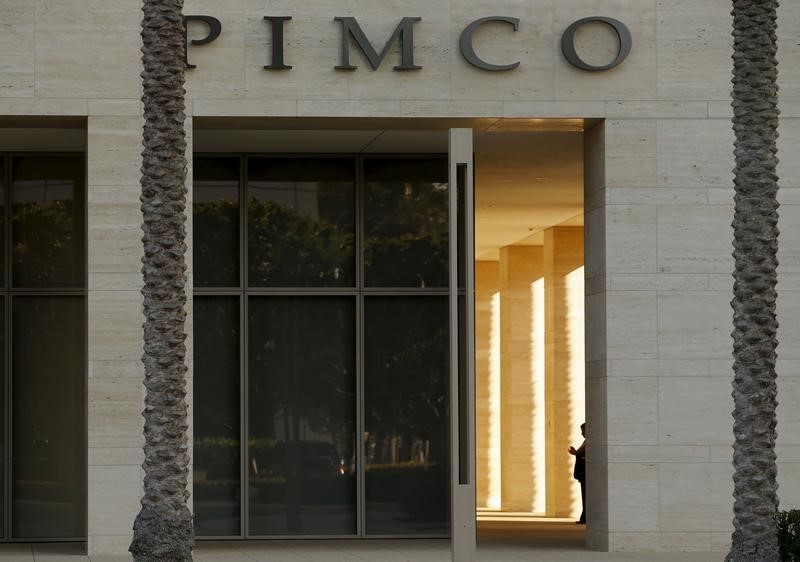(Bloomberg) -- Pacific Investment Management Co. is prepping for the next downturn, betting high-fee private funds can turbocharge its growth.
The firm, widely known for its publicly traded bond funds, is floating a private variation of Chief Investment Officer Dan Ivascyn’s $113 billion Pimco Income Fund, according to people with knowledge of the proposal. The vehicle would restrict redemptions, unlike Pimco’s largest mutual fund, while carrying lower risk than most of its other private funds, said the people, who asked not to be identified because the information isn’t public.
The potential new offering would add to a modest but growing part of Pimco’s products for larger and more sophisticated investors. The Newport Beach, California-based asset manager is taking steps in its push to issue more private funds such as hiring managers experienced in distressed debt, emerging markets and other opportunistic assets. Manny Roman, who became chief executive officer two years ago, expects the move will help the firm cash in when the next economic downturn comes.
“If we have a deep recession, which won’t be good for the world, there’ll be a lot of opportunity,” Roman, 55, said during an interview. “There will be a lot of capital to deploy.”
He and Ivascyn declined to discuss the firm’s specific private funds, citing regulatory restrictions on marketing.
Economic Outlook
The chances of a recession are “quite likely” in the next three to five years, Pimco said last month in its economic outlook -- and it could happen sooner.
“Our models, like many others, see an increased risk in 2020,” Ivascyn, 49, said.
As part of its expansion in private funds, Pimco is raising a $1.5 billion commercial real estate debt fund, according to a presentation for the Pennsylvania Public School Employees’ Retirement System, which invested $200 million in July. It’s also amassing the Pimco CLO Opportunities Strategy Fund, which buys debt and equity slices of collateralized loan obligations.
Private funds are sold to so-called accredited investors who agree to the steeper costs and longer lockups in exchange for potentially lofty returns. The strategy distinguishes Pimco, which oversees about $1.72 trillion, from rivals such as Fidelity Investments that have been competing for assets by slashing fees. But Pimco faces a flush field of private credit specialists like Ares Management LP, Blackstone (NYSE:BX) Group LP and Oaktree Capital Group LLC.
The private fund strategy relies more on skills than scale and carries growing risks as more asset managers rush to put money to work, according to Devin Ryan, an analyst with JMP Securities in New York.
“We’ll probably look back in hindsight and see plenty of folks made bad decisions,” Ryan said in an interview. “But that may be somebody else’s opportunity later on.”
Over the past decade, Pimco has raised more than $25 billion for a dozen private funds. Customers can buy stakes in some for as little as $100,000 through Artivest Holdings, an online platform that pools qualified investor accounts into private equity and hedge funds.
Higher Fees
Pimco began exploring the alternative debt market in 2007 under initiatives Ivascyn helped start as a mortgage portfolio manager. The private structure provides more control of loan covenant packages and investor protections compared with the public securities that comprise most of Pimco’s assets, Ivascyn said.
BRAVO III, which invests in real estate and other debt opportunities, is among the biggest of Pimco’s private funds, at $4.6 billion. It charges a hedge-fund-like 1.5 percent management fee plus 20 percent of returns while targeting a 14 percent to 16 percent return rate and requiring a seven-year commitment. By contrast, the Pimco Income Fund charges institutional clients 0.5 percent of assets while averaging 5.5 percent annualized returns over the past five years and offering daily liquidity.
In anticipation of launching more private funds, Pimco is beefing up its ranks of investing professionals, with an emphasis on specialists in credit and high-tech quantitative investing, according to Roman. Recent hires include John Studzinski, a former managing director at Blackstone, to manage relations with large clients such as sovereign wealth funds; Geoffrey Jones and Gabriel Goldstein, formerly with Tennenbaum Capital Partners, to focus on private and opportunistic credit; and Erin Browne from UBS Group AG in asset allocation.
Many of the recruits will also manage publicly traded funds.
“They’re not distinct or separate from the members of the team focusing on more traditional mandates,” Ivascyn said. “They’re highly complementary.”
Source: Fund presentations
*Note: Includes Fund II only; Distressed Credit Fund total not available
